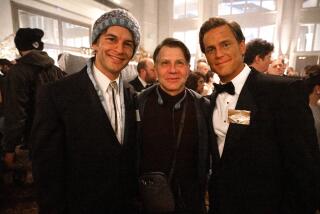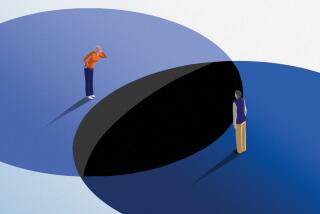Book review: ‘Stephen Hawking: An Unfettered Mind’
- Share via
Stephen Hawking
An Unfettered Mind
Kitty Ferguson
Palgrave Macmillan: 320 pp., $27
Today is Stephen Hawking’s 70th birthday. It’s an event worth marking, not least for its profound unlikelihood. As many even outside the physics community know, he learned about 50 years ago that he had amyotrophic lateral sclerosis (a.k.a. Lou Gehrig’s disease). He was given two years to live. However, at the time he was just coming into his own as a theoretical physicist, and he couldn’t be bothered to die.
Kitty Ferguson, a graduate of Juilliard and author of this intelligent and readable biography, “Stephen Hawking: An Unfettered Mind,” is astonishing in her own right. This is not her first book about Hawking — or for that matter, about theoretical physics, an avocation she took up in her 40s after a 20-year career as a singer and orchestra conductor. Her earlier and well-received Hawking book, “Stephen Hawking: Quest for a Theory of Everything,” came out in 1991, when, as Lucasian Professor of Mathematics (the chair held by Isaac Newton) at Cambridge, Hawking had settled on superstring theory as the top candidate for TOE, the appalling acronym theoretical physicists have bestowed on their elusive “ultimate theory.”
TOE won’t really explain “everything” to you, but it will marry Einsteinian general relativity to quantum mechanics. Both work beautifully, the former predicting the behavior of the macro world — apples, moons, galaxies — and the latter predicting subatomic behavior. Both theories are undeniably valid, but in certain circumstances they cannot both be true.
Ferguson has now brought Hawking’s life up to date. (There will be no more physics in this review; suffice it to say that Hawking’s new favorite TOE candidate is M-theory. In the physics empyrean there’s not even agreement about what the M stands for: Mother. Mystery. Membrane. Matrix. Take your pick.) She begins when Stephen was a perfectly healthy kid and not much of a scholar. At St. Albans public school, age 11, he was third from the bottom of his class. However, like many future physicists, he wondered obsessively about the universe: How big is it? Did it have a beginning? Will it have an end? He was 15 when he learned that it is expanding. Rattled, he was “sure there must be some mistake.” At 70, he is still preoccupied with these matters; recently he told an interviewer from Discover magazine that his goal is “a complete understanding of the universe, why it is as it is, and why it exists at all.”
Ferguson has had generous access to Hawking over the years, even acting as a consultant on his 2001 book “The Universe in a Nutshell.” She is a careful explicator not only of his ideas but of the context in which they arose, starting with his upbringing in an intellectually inclined family of compulsive readers, who sat at the dinner table “uncommunicative, their noses buried in their books.” At 17, when he went up to Oxford despite his “lackluster” performance at St. Albans, he whooshed through the physics in the entrance exams. Thereafter, he had a swell time coxing on the rowing team and going to parties. It was not until his third year that he settled on theoretical physics and particularly cosmology, choosing Cambridge for his graduate work because Fred Hoyle, champion of the Steady State universe (expanding but beginningless and endless) and loather of the Big Bang, was there.
It was in Hawking’s first year at Cambridge that he was diagnosed with what the British call “motor neuron disease.” Depression set in. “Reports … that I drank heavily are an exaggeration,” he told Ferguson. “I felt somewhat of a tragic character. I took to listening to Wagner.” He remains a Wagner fan, but the depression waned as his Cambridge career flourished, culminating in 1979 in the Lucasian professorship.
The chronicle of his progressive physical deterioration and his parallel ascent to iconhood is painstakingly presented. Ferguson emphasizes his unbelievable insouciance as speech and movement failed him (today he controls his computerized speech synthesizer by twitching a cheek muscle), noting that he was “notorious on at least two continents for his hair-raising wheelchair driving. Students would bound ahead into traffic … to stop cars, trucks, and bicycles as he recklessly barreled ahead assuming he had the right of way.”
Five years ago, Hawking went weightless in a Boeing 727 that gives passengers the zero-gravity experience of space travel. Free of earthly constraints at last, he loved it. “The human race shouldn’t have all its eggs in one basket or on one planet,” he told NBC News after the flight. “Getting a portion of the human race permanently off the planet is imperative for our future as a species.” He’s so right — although killjoys argue that perpetuating our species isn’t much of a goal. Hawking plans to go up any day now on one of the first commercial Virgin Galactic suborbital space flights. Good luck to him! And many happy returns.
Lippincott is a freelance editor specializing in science.
More to Read
Sign up for our Book Club newsletter
Get the latest news, events and more from the Los Angeles Times Book Club, and help us get L.A. reading and talking.
You may occasionally receive promotional content from the Los Angeles Times.







